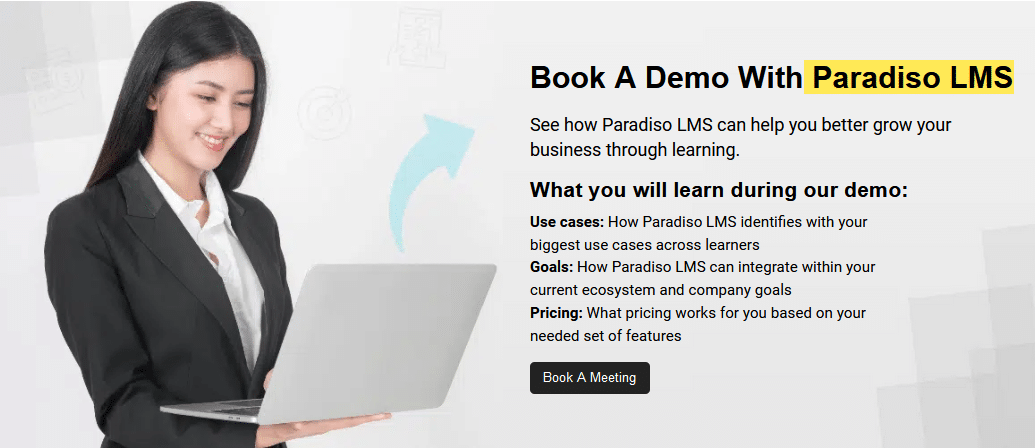When people think about learning, they often envision traditional settings like schools, further education institutions, or one-time training sessions. However, with the world increasingly digitized, education and training are evolving to keep pace. eLearning is revolutionizing how we learn by enhancing engagement, improving retention, and reducing costs.
Best Learning Management Systems for Training Companies

The growth of the Learning Management System (LMS) market reflects this shift, with projections indicating it will reach approximately $21 billion by 2027 at a CAGR of 17.4%. This growth trajectory suggests a promising future for the LMS market, with vendors adapting to serve this expanding market by splitting into two main categories: those catering to educational institutions and those focusing on corporate training for professional sectors.
This blog aims to comprehensively understand corporate LMS, including their features, use cases, benefits, and how to select the best LMS for your training needs. Let’s begin by understanding what exactly an LMS is.
What is a Learning Management System (LMS)?
An LMS is a web-based software organization that plans, develops, delivers, and tracks training programs for internal and external audiences. The acronym LMS stands for Learning Management System, encapsulating its core purpose visually and comprehensibly.
LMS’s analytics and reporting capabilities allow businesses to monitor progress and tailor training programs to meet specific needs, significantly contributing to employee upskilling and aligning workforce competencies with organizational goals.
Key Features of an Ideal LMS for Training Companies
An ideal Learning Management System (LMS) for training companies should offer features that cater to the dynamic needs of modern learners and educators.
-
Customizing Your LMS to Fit Your Training Needs
Ensuring it perfectly aligns with your training needs is crucial when selecting an LMS. Different organizations have varied training requirements, and a one-size-fits-all approach seldom works.
-
Defining Your Training Objectives
Start by clearly outlining your training objectives. Are you looking to enhance employee onboarding, offer continuous professional development, or provide compliance training? Defining these goals will help you choose an LMS tailored to your needs.
-
Leveraging Adaptive Learning Technologies
Modern LMS platforms are increasingly incorporating adaptive learning technologies. These systems use AI to personalize the learning experience, adapting the content and delivery based on the learner’s performance and preferences. This ensures that each employee receives a unique and effective learning journey.
-
Integration Capabilities for Seamless Workflow
An LMS’s ability to integrate with other software is paramount in today’s digital workplace. This connectivity streamlines workflows and enhances the overall learning experience.
-
Connecting with HR and CRM Systems
Integrating your LMS with HR and CRM systems can automate many administrative tasks. For instance, when new employees are added to your HR system, they can automatically enroll in onboarding courses within the LMS. Similarly, CRM integration can help in tracking the impact of training on sales performance and customer interactions.
-
Utilizing APIs for Custom Integrations
APIs (Application Programming Interfaces) allow for custom integrations, enabling your LMS to communicate with various other software solutions. This flexibility ensures the LMS can grow and evolve with your organization’s needs, providing a truly bespoke training solution.
-
Enhanced Analytics and Reporting for Continuous Improvement
One of the standout features of modern LMS platforms is their advanced analytics capabilities. These tools provide deep insights into the effectiveness of your training programs.
-
Real-Time Data for Immediate Feedback
Access to real-time data allows trainers to provide immediate feedback to learners, fostering a more interactive and engaging learning environment. This real-time insight is crucial for addressing learning gaps as they occur.
-
Gamification for Motivating Learners
Gamification adds game design elements to learning, such as points, badges, and leaderboards. These features make learning fun and competitive, motivating employees to complete courses and achieve their training goals.
-
Social Learning for Collaborative Environments
Social learning features like discussion forums, peer reviews, and group projects create a collaborative learning environment. These features encourage interaction among learners, fostering a sense of community and enhancing the overall learning experience.
Insider Tips To Choose The Perfect Learning Management System
Download now to get insider tips on choosing the perfect Learning Management System!

6 Benefits of Implementing an LMS for Training Companies
Implementing a Learning Management System (LMS) can transform how training is delivered and managed, providing numerous benefits that enhance learning experiences and business outcomes.
-
Unparalleled Accessibility and Flexibility
An LMS makes training accessible anytime and anywhere, allowing employees to learn at their own pace and convenience. This flexibility supports remote and hybrid work models, broadening the reach of training programs and empowering employees to take control of their learning journey.
-
Data-Driven Personalization
Modern LMS platforms use data analytics to create personalized learning experiences. Customized content that addresses individual knowledge gaps and interests can be recommended by analyzing learner behavior and progress. This personalized approach increases engagement and motivation, ensuring learners receive training relevant to their roles and career goals.
-
Cost Efficiency and Resource Optimization
Transitioning to an LMS can result in significant cost savings, eliminating expenses related to travel, venue rentals, printed materials, and instructor fees. Automation features also streamline administrative tasks like enrollment, scheduling, and reporting, freeing up valuable time and resources to enhance training content.
-
Enhanced Collaboration and Knowledge Sharing
Features like discussion forums, group projects, and peer reviews foster a collaborative learning environment. These allow employees to interact, share insights, and learn from each other, enriching the learning experience and building a sense of community among employees.
-
Robust Tracking and Compliance
Tracking and reporting capabilities ensure all training requirements are met and documented, simplifying compliance audits and maintaining adherence to industry standards. Detailed analytics allow companies to monitor training program effectiveness and make data-driven improvements.
-
Scalability to Support Growth
As training needs evolve and organizations grow, an LMS offers the scalability to support expansion. Whether onboarding new hires, introducing new product training, or expanding into new markets, an LMS can handle increased demand without compromising quality, ensuring consistent, efficient, and effective training programs.
How To Choose the Right LMS for Your Training Company
When selecting an LMS for your training company, thinking beyond basic features and functionalities is crucial. A well-chosen LMS can significantly influence your company’s growth, learner satisfaction, and efficiency. Here are some insights to help you make an informed decision:
-
Industry-Specific LMS Options
LMS platforms are often tailored for specific industries, such as healthcare, manufacturing, and financial services, each with unique training needs. Look for an LMS that offers features tailored to your industry, such as compliance tracking, certification management, and role-based learning paths. These specialized solutions can ensure your training process runs smoothly and meets industry standards.
-
AI Integration
Modern LMS platforms increasingly incorporate AI to enhance learning experiences. These technologies can offer personalized learning paths and predictive analytics to identify at-risk learners and automate administrative tasks. AI can also help create adaptive assessments that adjust in difficulty based on a learner’s performance, providing a more personalized and practical learning experience.
-
Gamification and Social Learning
Consider LMS platforms with gamification features like leaderboards, badges, and point systems to boost engagement. Social learning features like discussion forums, peer reviews, and collaborative projects can build a sense of community among learners and encourage knowledge sharing.
-
Data Privacy and Security
With growing concerns about data privacy and cybersecurity, choosing an LMS that prioritizes these aspects is crucial. Ensure the LMS complies with data protection regulations like GDPR and HIPAA. Look for data encryption, secure user authentication, and regular security audits to protect sensitive learner information.
-
User Experience and Accessibility
An LMS should be accessible to all users, including those with disabilities. Platforms that adhere to WCAG (Web Content Accessibility Guidelines) ensure your training materials are usable by individuals with varying abilities. This includes features like screen reader compatibility, keyboard navigation, and adjustable text sizes, demonstrating your commitment to inclusive education.
-
Future-Proofing Your Investment
Technology evolves quickly, and so should your LMS. Choose platforms committed to continuous improvement and regular updates to stay current with industry trends. Future-proofing your LMS investment ensures you can adapt to new training methods, emerging technologies, and changing learner expectations without frequent platform changes.
Top 5 Best Learning Management Systems for Training Companies
-
Paradiso LMS
Paradiso LMS is a feature-rich platform that delivers a seamless learning experience across various sectors. It integrates effortlessly with numerous third-party applications, including CRM, HRIS, and video conferencing tools. The platform’s standout features include multi-tenant architecture, which allows for managing multiple clients or departments within a single instance, and advanced reporting capabilities that enable administrators to generate detailed insights into learner progress.
Paradiso LMS also offers personalized learning paths, competency-based learning, and certification management to ensure that training objectives are met effectively. -
CYPHER Learning
CYPHER Learning is a versatile, user-friendly platform supporting learning initiatives in schools, businesses, and other organizations. It creates engaging courses with rich content authoring tools and an extensive resource library.
The platform promotes interactive learning through forums, wikis, and blogs, fostering collaboration. CYPHER Learning also features automated grading, personalized dashboards, and e-commerce capabilities for those looking to monetize their courses. -
Absorb LMS
Absorb LMS is an award-winning platform for managing and delivering corporate training programs. Its intelligent automation and intuitive design streamline training administration, saving time and reducing complexity.
Absorb’s learner engagement tools, such as leaderboards and badges, motivate users to complete their training. The platform also offers customized interfaces to match company branding, ensuring a consistent user experience. -
D2L Brightspace LMS
D2L Brightspace LMS is known for its innovative approach to education and training. It supports blended learning models and offers extensive assessment tools for accurate learner performance evaluation.
The platform’s analytics engine provides deep insights into learner behavior, helping educators tailor the learning experience. D2L Brightspace emphasizes accessibility, ensuring all learners benefit from the platform’s offerings regardless of their abilities. -
Blackboard Learn LMS
Blackboard Learn LMS is a comprehensive solution that has led educational technology for years. Its flexible course management tools support various teaching and learning styles. Instructors can create interactive assignments, manage grades efficiently, and communicate with learners through multiple channels.
Blackboard Learn includes robust security features to protect sensitive information and ensure compliance with industry standards.
Conclusion: Empower Your Training Company with the Right LMS
Choosing the right Learning Management System (LMS) can change how training companies deliver and manage education. An effective LMS is one with features like adaptive learning technologies, seamless integration capabilities, advanced analytics, and engaging multimedia content; training companies can offer personalized and practical training programs that address the unique needs of each learner.
The impact of the right LMS on training outcomes is profound. With the right LMS, training becomes more flexible and accessible, allowing learners to study at their own pace and convenience. Integrating gamification and social learning features can significantly boost motivation and engagement, fostering a collaborative and interactive learning environment. Additionally, the cost-efficiency and scalability of LMS platforms mean that as your training needs grow, your system can adapt without incurring significant additional expenses.
Training companies must embrace the future of learning through advanced LMS solutions. By investing in a modern, future-proof LMS, companies can ensure they stay competitive and meet the evolving needs of their learners. This investment enhances the quality and effectiveness of training programs and supports continuous growth and improvement, ultimately leading to better training outcomes and a more skilled workforce.













